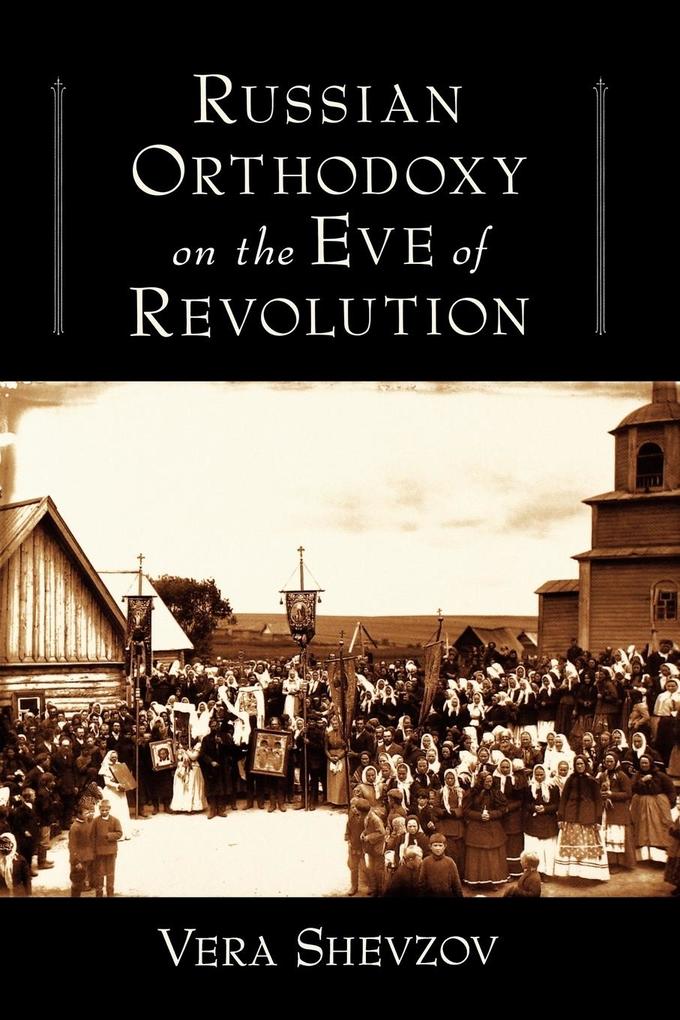
Zustellung: Fr, 13.06. - Di, 17.06.
Versand in 6 Tagen
VersandkostenfreiBestellen & in Filiale abholen:
Since the collapse of the Soviet Union, Orthodox Christianity in Russia has enjoyed a remarkable resurgence. Many Russians are now looking to the history of their faith as they try to rebuild a lost way of life. Vera Shevzov has spent ten years researching Orthodoxy as it was lived in the years before the 1917 Revolution. In Russian Orthodoxy on the Eve of Revolution, she draws on a rich variety of previously untapped archival sources and published worksunavailable in the West to reconstruct the religious world of lay people. Russian Orthodoxy on the Eve of Revolution breaks new ground by giving voice to the previously-ignored common people during this period immediately preceding one of the most important events of the twentieth century.
Produktdetails
Erscheinungsdatum
01. Juni 2007
Sprache
englisch
Seitenanzahl
376
Autor/Autorin
Vera Shevzov
Verlag/Hersteller
Produktart
kartoniert
Gewicht
570 g
Größe (L/B/H)
234/156/20 mm
ISBN
9780195335477
Entdecken Sie mehr
Pressestimmen
"An important work for all collections"--Choice"Vera Shevzov's book on Orthodoxy in late imperial Russia is much more than welcome: it is simply necessary....Shevzov peels away layers of both Soviet and post-Soviet misperceptions of Orthodoxy, drawing a clear line, for example, between superstition and ritual--sometimes a problem for Orthodoxyin present-day Russia. Along the way, we garner all sorts of fascinating insights into religious practice and stories from the lived experience of laypeople....Russian Orthodoxy on the Eve of Revolution immediately takes its place as an essential contribution to our understanding (or lack thereof)of religious life in the nineteenth century Russian empire."--Slavic Review"The magisterial comprehensiveness of Russian Orthodoxy on the Eve of Revolution, therefore, does not just fill a gap: it opens up a whole new area of nineteenth century ecclesiastical historiography."--Theology"A fascinating study....Shevzov's book is not only of immense interest as a historical study, but contirbutes to an understanding of the Russian Orthodox Church today."--Times Literary Supplement,.".this poioneering volume represents a monumental contribution to the growing literature on the much-neglected sphere of religion. It provides richly detailed descriptions, crip and probing analyses, and fresh new perspectives on Orthodoxy and the Orthodox on the eve of revolutionarycataclysm."--The Russian Review,.".a welcome addition to a growing historical literature on "lived" religious experience in the Russian Empire. Imaginative and thoroughly researched, it should serve as a standard reference work for scholars of Russia, Europe, andreligion more generally.--American Historical Review"Vera Shevzov sets before us the rich diversity, the spiritual ferment, and the desire for change that found expression in the voice of the people, even in their loyalty to Holy Tradition. Anyone who wants to understand either Russian Pravoslavie or the Marxism-Leninism that (temporarily!)supplanted it must read her report from the front line."--Jaroslav Pelikan, Sterling Professor Emeritus of History, Yale University"This is a remarkable book! With masterful attention to detail, Shevzov presents a fascinating and challenging picture of the Russian Orthodox Church on the eve of the revolutionary period, from the corridors of power in St. Petersburg to the humblest provincial village chapel. In the process sheoffers a helpful corrective to much of modern scholarship, which tends to contrast and even oppose 'popular religion' to 'official religion.' She convincingly argues that 'lived religion' in pre-revolutionary Russia was at once 'popular' and 'official.'"--John H. Erickson, Dean and Peter N.Gramowich Professor of Church History, St. Vladimir's Orthodox Theological Seminary"Russian Orthodoxy on the Eve of the Revolution is a magisterial study of religious identity and community in late Imperial Russia. Vera Shevzov explores both the abstract conceptualizations of what the Russian Orthodox church should be, and the many-faceted ways in which the Christian community wasrealized in daily life. With rich detail and sympathetic insight, Shevzov presents the strivings of clergy and laity, elite and modest peasants and townspeople, to identify an authentic Christianity and live according to its precepts. Shedocuments conflict and contention, as lay believers, empowered by confidence in their own Orthodoxy, challenged state and church leaders. At the same time, she reveals the shared values and common concern across the social spectrum of believers to maintain the centrality of religious faith and practice amidst the challenges of modernity andrevolutionary upheaval."--Eve Levin, Department of History, University of Kansas"In Russian Orthodoxy on the Eve of Revolution Vera Shevzov takes us on an exceptionally well-conceived tour of five "sacred centers" of Russian Orthodoxy: churches, chapels, feasts, icons, and the veneration of Mary. Thanks to the erudition, uncanny eye and eloquence of our guide, we see theRussian church tradition in all its color, emotion, energy, inventiveness, activism-in a word, in all itslife."--Paul Valliere, McGregor Professor in the Humanities, Butler University
Bewertungen
0 Bewertungen
Es wurden noch keine Bewertungen abgegeben. Schreiben Sie die erste Bewertung zu "Russian Orthodoxy on the Eve of Revolution" und helfen Sie damit anderen bei der Kaufentscheidung.









